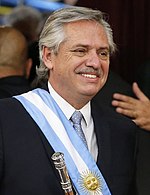Elizabeth Gómez Alcorta
Elizabeth Gómez Alcorta | |
|---|---|
 | |
| Minister of Women, Genders and Diversity | |
| Assumed office 10 December 2019 | |
| President | Alberto Fernández |
| Preceded by | Position established |
| Personal details | |
| Born | 18 November 1972 San Isidro, Buenos Aires Province, Argentina |
| Political party | Patria Grande Front |
| Other political affiliations | Frente de Todos (since 2019) |
| Alma mater | University of Buenos Aires |
Elizabeth Gómez Alcorta (born 18 November 1972) is an Argentine lawyer, professor and politician, currently serving as Minister of Women, Genders and Diversity since 10 December 2019. She is the first person to hold that office.
She rose to prominence in 2016 as the attorney of activist and social leader Milagro Sala.
Early life and career[]
Gómez Alcorta was born in San Isidro, in the suburbs of the Greater Buenos Aires, in 1982. She studied law at the University of Buenos Aires, graduating in 1997 with honors; she is the first university graduate in her family.[1] She is a member of the Centro de Estudios Legales y Sociales (CELS), and worked in the Justice Ministry and the Council of Magistracy, where she became involved in judicial matters pertaining to victims of state-sponsored terrorism during the last military dictatorship (1976–1983).[1][2] Additionally, she has been a faculty of the University of Buenos Aires School of Law, her alma mater.[3]
She rose to prominence in 2016 as the defending attorney of activist and social leader Milagro Sala, who stands accused of embezzlement.[4] According to Gómez Alcorta, Sala was "sentenced for being a woman", and the charges against her constitute a "witch-hunt never seen before in the democratic era";[2][5] she maintains Sala is a political prisoner.[6]
Gómez Alcorta is a member of Mala Junta, a "feminist, popular, mixed and dissident" collective organized within the Patria Grande Front.[1][7] She is a vocal supporter of the legalization of abortion in Argentina.[1][2][3]
Ministry of Women, Genders and Diversity[]
Ahead of the 2019 general election, then-presidential candidate Alberto Fernández announced his intention of creating of a new government ministry dedicated to overseeing public policies pertaining to women's issues, especially the issue of gender-based violence against women.[8][9] Gómez Alcorta was touted by Fernández and vice-presidential candidate Cristina Fernández de Kirchner to head the new ministry ahead of the Frente de Todos ticket's victory in the 2019 election.[10]
Under Gómez Alcorta's vision, the new ministry was subdivided into two secretariats, one dedicated to designing and implementing policies to mitigate gender-based violence against women, and another tasked with implementing policies related to equality and gender and sexual diversity.[10][11] Gómez Alcorta has stated that the ministry's ultimate goal is "to mainstream and federalize gender policies across the Government's administration".[11]
In July 2020, Gómez Alcorta presented a $ 18,000 million-national plan against gender-based violence projected for the 2020-2022 period, aimed at reducing extreme violence, ensuring economic autonomy for victims of gender-based violence and seizing cultural and structural aspects.[12] The plan establishes 15 points of action, including the establishment of comprehensive territorial centers, a revamp of the 144 gender violence emergency line, and economic help for women and LGBT+ people at risk.[13]
References[]
- ^ a b c d Carbajal, Mariana (7 December 2019). "Quién es Elizabeth Gómez Alcorta". Página/12 (in Spanish). Retrieved 27 April 2020.
- ^ a b c "Elizabeth Gómez Alcorta, la futura ministra de las Mujeres, Géneros y Diversidad que calificó a Macri de "cuasi fascista"". La Nación (in Spanish). 6 December 2019. Retrieved 27 April 2020.
- ^ a b "Elizabeth Gómez Alcorta, la ministra feminista que milita y va a las marchas". Clarín (in Spanish). 6 December 2019. Retrieved 27 April 2020.
- ^ "La abogada de Milagro Sala, una chica de San Isidro fanática de Fidel Castro". Clarín (in Spanish). 15 December 2016. Retrieved 27 April 2020.
- ^ ""Milagro Sala está presa por ser mujer", aseguró una futura ministra de Alberto Fernández". tn.com.ar (in Spanish). 4 December 2019. Retrieved 27 April 2020.
- ^ Dandan, Alejandra (30 May 2017). "El caso tiene que ver con el disciplinamiento". Página/12 (in Spanish). Retrieved 27 April 2020.
- ^ "Un frente antineoliberal". Página/12 (in Spanish). 27 October 2018. Retrieved 27 April 2020.
- ^ "Alberto: "Crearemos un ministerio de la mujer, la igualdad de género y la diversidad"". Perfil (in Spanish). 11 October 2019. Retrieved 27 April 2020.
- ^ "Fernández impulsará el ministerio de la Mujer". Agencia Paco Urondo (in Spanish). 1 June 2019. Retrieved 27 April 2020.
- ^ a b Iglesias, Mariana (14 December 2019). "Elizabeth Gómez Alcorta: "La sensación que tienen las compañeras en la calle es que el ministerio es de todes"". Clarín (in Spanish). Retrieved 27 April 2020.
- ^ a b Carbajal, Mariana (14 December 2019). "Las pautas que guiarán la gestión de Elizabeth Gómez Alcorta". Página/12 (in Spanish). Retrieved 27 April 2020.
- ^ Slipczuk, Martín (19 July 2020). "Nuevo plan contra la violencia de género: cuáles son sus objetivos y qué cambió". Chequeado (in Spanish). Retrieved 19 September 2020.
- ^ Carbajal, Mariana (4 July 2020). "Un Plan Nacional para accionar contra la violencia de género". Página/12 (in Spanish). Retrieved 19 September 2020.
External links[]
| Wikimedia Commons has media related to Elizabeth Gómez Alcorta. |
- 1972 births
- Living people
- Argentine lawyers
- Argentine feminists
- Argentine human rights activists
- Women human rights activists
- 21st-century Argentine women politicians
- 21st-century Argentine politicians
- Government ministers of Argentina
- Women government ministers of Argentina
- Women's ministers
- People from San Isidro, Buenos Aires
- University of Buenos Aires alumni
- University of Buenos Aires faculty
